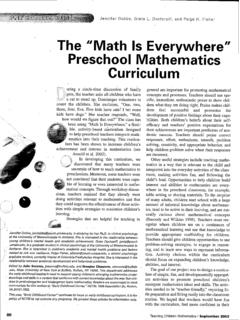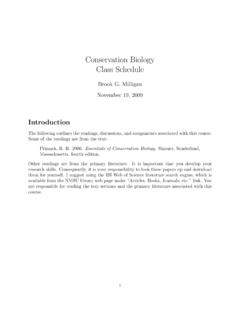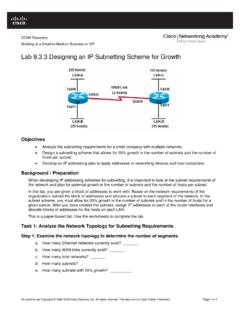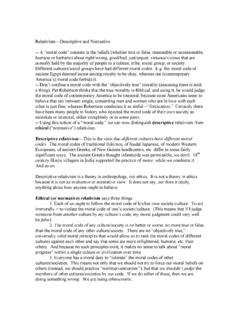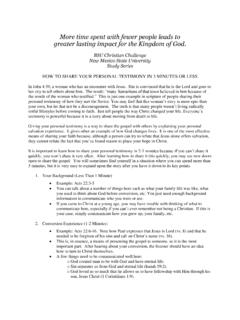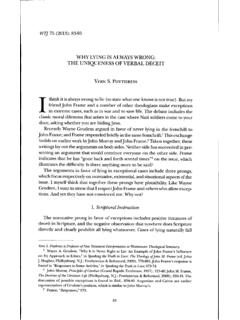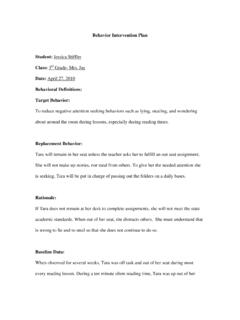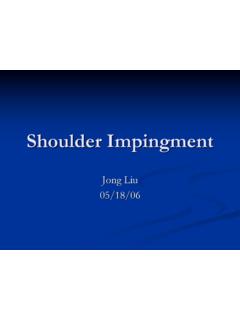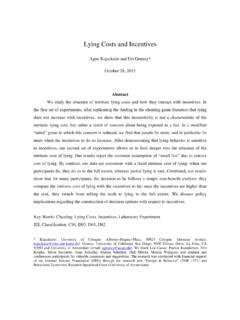Transcription of Some Moral Theories and What They Say about Truth
1 some Moral Theories and what they Say about lying 1. Acts and Moral Principles Whenever someone claims that a certain action was wrong, it makes sense to ask that person why. what was it about the act that you think made it wrong? In asking this, we are asking the person to identify a Moral principle or set of principles that apply to the action in question and imply that it is wrong. Suppose that Frank is someone who uses drugs like crystal meth when he parties with certain friends, that some of these friends call to see if he wants to party with them, and that Frank s girlfriend, Mary, answers the phone. Hearing who it is, she tells the caller that Frank is not home. When Frank asks her who just called, she lies and says that it was a telemarketer. She does this because she is trying to help Frank stop using drugs.
2 She believes that he is trying to stop, but she also believes that if he goes partying with these friends he ll probably give in to temptation and resume his drug use. So she tells him a paternalistic lie, deceiving him for what she thinks is his own good. If you think that what Mary did was wrong, then you ought to be able to identify a Moral principle that she violated. Perhaps you think that what Mary did was wrong simply because she told a lie and lying is always wrong. She violated a Moral principle that absolutely forbids lying . Perhaps you think that not just Mary but anyone (yourself included) acts wrongly if they tell a lie for any reason whatsoever. An absolute prohibition on lying is a possible Moral principle. Suppose that Frank discovers the lie and objects.
3 Mary s belief that Frank really wants to stop using crystal meth was based on his assurances that this was so, but he didn t mean it. He was lying to her, because he didn t want her to leave him. In fact, he routinely lies to Mary (and others) whenever he thinks it s necessary, and he sees nothing wrong with it. If Frank wants to condemn Mary for lying to him, he needs to cite Moral principles that explain why. But any remotely plausible Moral principle that forbids Mary s lying to Frank will probably also forbid Frank s lying to Mary. Of course one can imagine some bizarre Moral principles that don t have that result such as It s always okay for drug users to lie to others, but never okay for a non-drug users to lie to drug users. But if Frank appealed to that principle to defend his Moral judgment about Mary, I think that we would doubt that he is being serious.
4 The principle seems obviously contrived or ad hoc. (If he insisted that he really does believe that such a principle is true, we should ask him to defend it. Why should drug users have special Moral privileges that are denied to others?) This doesn t mean that Frank can t condemn Mary. All it means is that he probably can t condemn her without admitting that what he frequently does to others is also wrong. We have to be consistent in our Moral judgments. Whatever Moral principles I cite to defend my judgment that you acted wrongly are principles that I have to be prepared to apply to my own behavior. The same requirement holds for all of us. ( Moral philosophers often refer to this as the universalizability requirement ). 2. Five Moral Theories . what is the correct Moral principle about lying ?
5 (Note: lying is making a statement that one knows is false with the intent to deceive. It s possible to deceive without lying . Suppose that I dress as a priest, even though I m not one, because I know that you re a devout Catholic who ll confide in priests, and I want to find out some of your secrets. I ve clearly deceived you, even if I never lie and say I m a priest. ) Which Moral principle about lying is the one that belongs to the correct ordinary morality? (Recall that ordinary morality is the morality that is supposed to apply to all of us, just because we are human beings. It can be contrasted with role morality, or the morality that applies only to those people who occupy certain social roles. Professionals are bound by the rules of ordinary morality, just as everyone else is, but they are also bound by the role morality of their profession, because they also occupy the social role of being a doctor, attorney, engineer, or whatever).
6 I m going to assume that these questions have answers. Moral subjectivism is the view that right and wrong are all a matter of opinion, where any Moral opinion is just as valid or reasonable as its opposite. I m going to assume that Moral subjectivism is false. Questions about what s right and wrong, like questions in math and physics, have correct and incorrect answers. The answers may not always be easy to figure out or obvious. some Moral questions may be very difficult, leaving plenty of room for reasonable disagreement about what the correct answer to them is. But that s consistent with Moral objectivism s being true. Moral objectivism holds that there are Moral facts, just as there are math and physics facts, and that these facts are independent of people s opinions about or attitudes toward them.
7 Sincerely and fervently believing that you did the morally right thing does not guarantee that you did the morally right thing (any more than sincerely believing that Mt. Everest is the tallest mountain in the world guarantees that it really is the tallest mountain). The terrorists who flew the planes into the World Trade Center towers and killed thousands were firmly convinced that they were doing the right thing. If you think that they were mistaken about this, then you have to agree with Moral objectivism. If you think it makes sense to wonder if the Moral principles that you currently accept are correct or not, then you must assume that Moral objectivism is true. Moral objectivism says that there are correct (and incorrect) principles about when it s okay to lie.
8 There are three possibilities: i) it is morally wrong to lie in all circumstances, ii) it is morally permissible in all cases, and iii) it is sometimes permissible and sometimes wrong. Moral objectivism does not say that i) has to be the correct view. One could accept Moral objectivism and think that iii) is correct. Of course, stated as it is iii) isn t very helpful. what one wants to know is what are the Moral principles that explain when lying is okay and when it s wrong. In what follows I ll describe five different Moral Theories , focusing on what each says about lying . The Theories are: i) The divine command theory of right and wrong. ii) The natural law theory of right and wrong. iii) Act utilitarianism. iv) Kantian Moral theory, and v). Rule utilitarianism.
9 Each of these Theories offers its own answer to the question, How should one determine what are the correct Moral principles about anything, including lying ? 3. The divine command theory (or DCT). This view is in a way quite simple. It holds that if an act is wrong, what makes it wrong is the fact that there is a God who commands us not to perform acts of that type. If lying is wrong, then it s wrong because God forbids it. His forbidding it is what makes it wrong. In order to know what s right and wrong, one has to know what God s commands are. How does one figure out what God s commands are? Different world religions offer different answers to that question. According to the Jew one must turn to the Old Testament. According to the Moslem, it s the Koran.
10 According to the Christian, it s (mainly) the New Testament. The fact that there are many different religions with different views here means that there are many different versions of DCT: Christian DCT, Moslem DCT, etc. How can anyone know which if any of these religions is correct in its claims about what God s commands are? If the answer is unclear, that creates a problem for anyone who wishes to defend some version of DCT. what does Christian DCT say about lying ? Well, one of the Ten Commandments, the ninth, forbids bearing false witness against others. The main thing to notice about this commandment (as well as the other ones) is that it includes no qualifications and thus would seem to be absolute. It seems to say that bearing false witness against others is always wrong no matter how much good it would do or evil it would prevent, no matter whether one s objective in telling the lie is selfish or altruistic, no matter whether the lie would benefit the person being lied to, etc.
